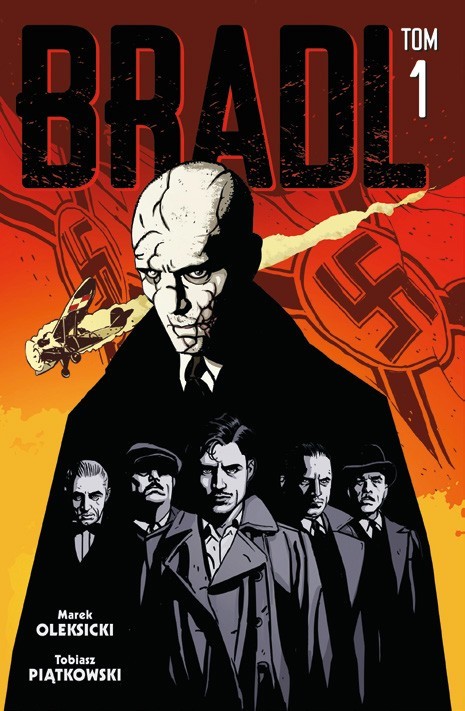Members of the Polish resistance clash with Nazis in the noir style

Members of the Polish resistance clash with Nazis in the noir style

Translation rights: Muzeum Powstania Warszawskiego, Egmont Polska, dbakowska@op.pl, kamilla.skonieczna@egmont.pl
The eponymous name Bradl is one of the many pseudonyms of Kazimierz Leski, an ace of Polish counterintelligence during World War Two. His wartime biography is full of daring missions carried out throughout Europe. The first two volumes of the graphic novel by Marek Oleksicki and Tobiasz Piątkowski recount the beginnings of Leski’s underground journey against the background of a Warsaw occupied by the Germans.
In the context of other comics devoted to the 20th-century history of Poland, Bradl distinguishes itself by its page design and the artists’ innovative approach to the subject. The difference is immediately signaled by the cover art, which connects to recognizable pop culture conventions – from horror to American superhero fiction. In fact, both artists tend to lean toward the noir style, creating a portrait of a mysterious Warsaw, atypical for Polish conditions, bathed in shadow, where members of a special unit of the Polish Underground State mercilessly clash with the ruthless forces of the occupier.
In addition to Leski, there is a gallery of equally colorful and diverse characters, who constitute the core of the “Musketeers” intelligence organization, methodically unraveling the actions and intentions of the Germans toward the Polish nation. We wander with them through Warsaw’s nightclubs, run through secret passages in the sewers, and prepare clever traps for enemy agents hunting the conspirators. The comic also includes beautiful, determined women and a classic, dark character, whose scar-covered face menaces us from the cover of the first volume.
Oleksicki and Piątkowski prove that one can present this painful period of history in an appealing way. Bradl is also a visual feast full of expressive panels as well as a historical story whose uniqueness lies in the skillful manipulation of pop cultural patterns.
Tomasz Miecznikowski, translated by Peter Obst
Selected samples
She climbed her first peaks in a headscarf at a time when women in the mountains were treated by climbers as an additional backpack. It was with her that female alpinism began! She gained recognition in a spectacular way. The path was considered a crossing for madmen. Especially since the tragic accident in 1929, preserved … Continue reading “Halina”
First, Marysia, a student of an exclusive private school in Warsaw’s Mokotów district, dies under the wheels of a train. Her teacher, Elżbieta, tries to find out what really happened. She starts a private investigation only soon to perish herself. But her body disappears, and the only people who have seen anything are Gniewomir, a … Continue reading “Wound”
A young girl, Regina Wieczorek, was found dead on the beach. She was nineteen years old and had no enemies. Fortunately, the culprit was quickly found. At least, that’s what the militia think. Meanwhile, one day in November, Jan Kowalski appears at the police station. He claims to have killed not only Regina but also … Continue reading “Penance”
The year is 1922. A dangerous time of breakthrough. In the Eastern Borderlands of the Republic of Poland, Bolshevik gangs sow terror, leaving behind the corpses of men and disgraced women. A ruthless secret intelligence race takes place between the Lviv-Warsaw-Free City of Gdańsk line. Lviv investigator Edward Popielski, called Łysy (“Hairless”), receives an offer … Continue reading “A Girl with Four Fingers”
This question is closely related to the next one, namely: if any goal exists, does life lead us to that goal in an orderly manner? In other words, is everything that happens to us just a set of chaotic events that, combined together, do not form a whole? To understand how the concept of providence … Continue reading “Order and Love”
The work of Józef Łobodowski (1909-1988) – a remarkable poet, prose writer, and translator, who spent most of his life in exile – is slowly being revived in Poland. Łobodowski’s brilliant three- volume novel, composed on an epic scale, concerns the fate of families and orphans unmoored by the Bolshevik Revolution and civil war and … Continue reading “Ukrainian Trilogy: Thickets, The Settlement, The Way Back”























































































































































































































































































